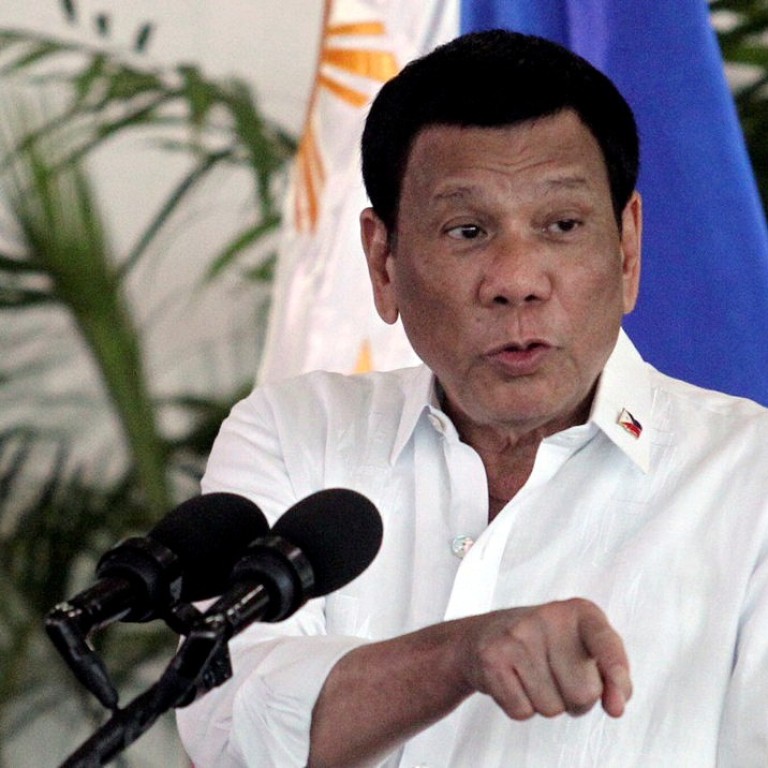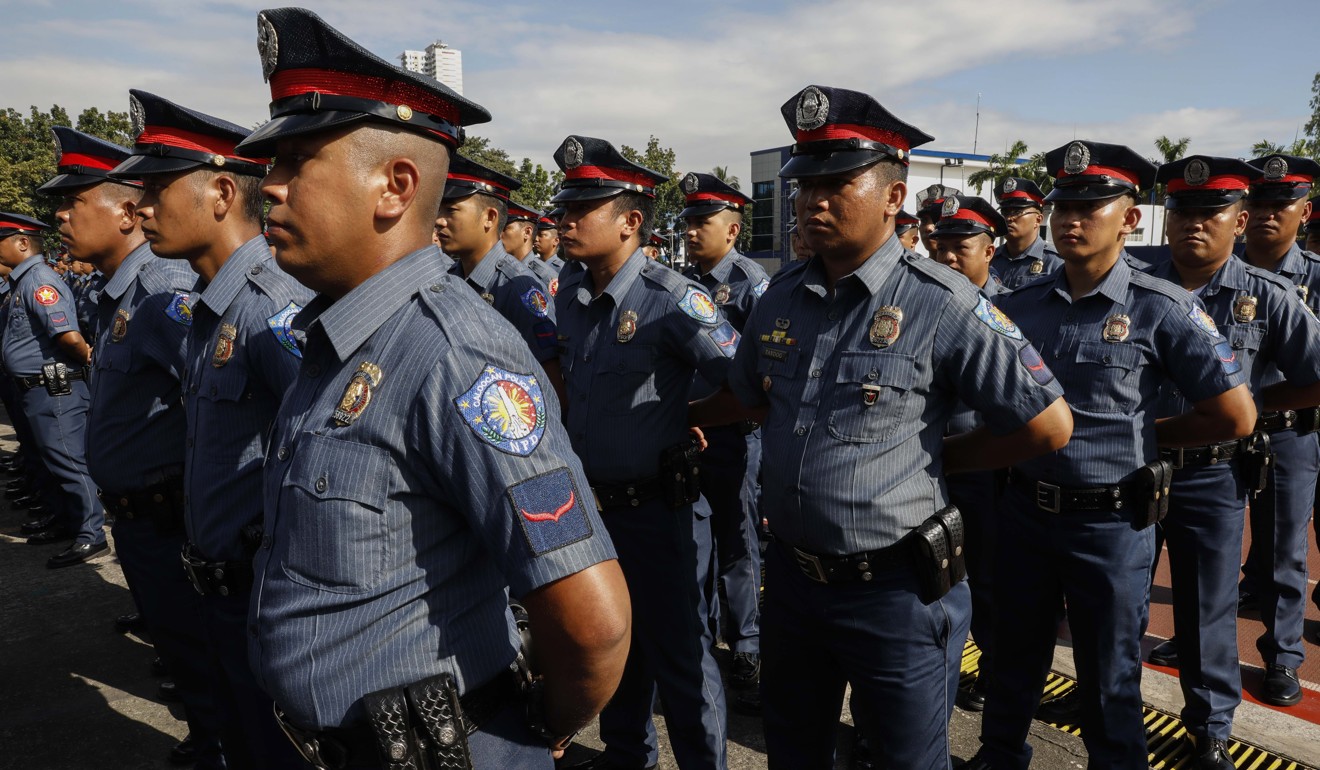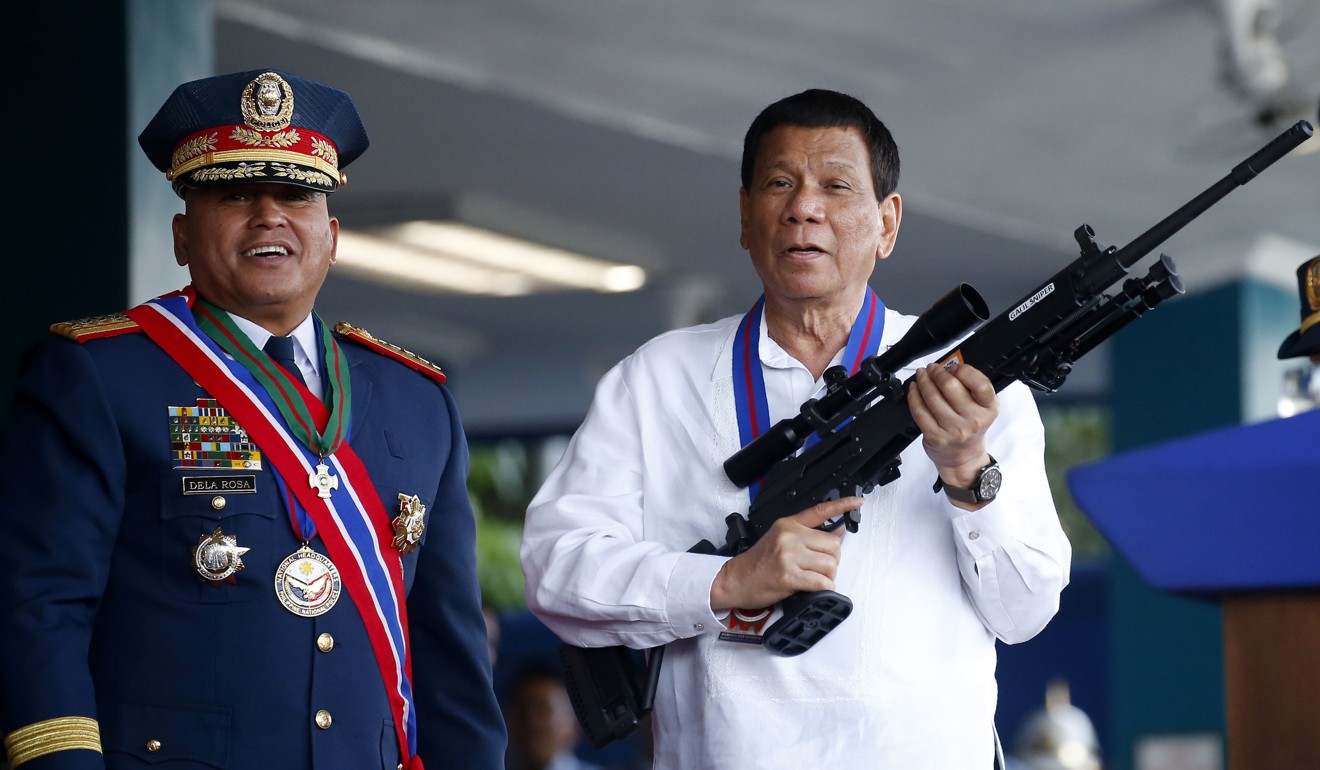
In Duterte’s drug war, Filipino ‘ninja cops’ are becoming the new dealers
- The scandal involves a group of corrupt policemen who seize drugs and go into business for themselves
- Despite widespread condemnation and an ongoing senate investigation, none of these policemen has ever even been arrested
Implicated in the scandal by two retired senior police officials is the man Duterte personally appointed last year to command the Philippine National Police (PNP) – Director General Oscar Albayalde.
If I were him, I would probably consider resigning already
“If I were him, I would probably consider resigning already,” said senator Richard Gordon, who is heading the probe into the scandal. He made the remark on October 1 following ongoing senate hearings that revealed how Albayalde had tried to protect a group of policemen who had allegedly seized drugs before going into business for themselves as dealers, a practice known as “drug recycling”.
Rogue Filipino officers contracting themselves out to Chinese loan sharks
“The tokhang [war on drugs] campaign, which has killed thousands of people and supposedly drug dealers … loses its credibility when you hear of these allegations between high-ranking officials of the PNP,” senate minority floor leader Franklin Drilon told reporters.
Testifying before a senate joint committee on October 3, Philippine Drug Enforcement Agency (PDEA) chief Aaron Aquino said as part of the war on drugs: “We also need to launch an even greater battle against the demon inside our own backyard … we have to respond not later but now.”
The senate joint committee was originally investigating irregularities in the early release of prisoners, but it soon found its way to accusations of police skulduggery.

Among the details heard by senators was a 2013 operation that saw 13 policemen in the town of Mexico – in Pampanga province, north of Manila – raid a crystal meth lab run by a Chinese national.
The police arrested the alleged drug lord, Johnson Lee, and seized more than 200kg of drugs, locally called shabu – but they released Lee after he allegedly paid them millions, and produced a different “suspect”, Ding Wenkun. They then declared they had found only 38kg of shabu. The other 162kg the police did not turn over was estimated to be worth 648 million pesos (US$12.49 million).
Baguio City mayor Benjamin Magalong, who was at the time chief of the PNP’s Criminal Investigation and Detection Group, told senators authorities became suspicious because of anomalies in police reports, and signs that those who conducted the raids had not followed proper procedures.
From Philippine jails, Chinese drug lords ‘are directing illegal trade’
More telling was the fact that all members of the raiding team suddenly bought themselves brand new sports utility vehicles. In 2014, an order went out for the team to be dismissed for grave misconduct, and their commander, the police director of Pampanga, was relieved of his post over his failure to take corrective action. That commander’s name? Oscar Albayalde.
In a television interview on October 2, Senator Gordon said it was impossible for Albayalde to have been ignorant of the raid’s irregularities.
In the hearing, Magolong claimed Albayalde had also bought a brand new vehicle after the raid. Far from being disgraced, however, Albayalde moved on to higher positions. He was appointed regional director of the National Capital Region Police Office (NCRPO) by Duterte in 2016, and then PNP chief in 2018.

In 2016, as NCRPO chief, Albayalde called up PDEA chief Aquino – who was then a PNP regional director – and asked him not to implement the pending dismissal order against the 13 ninja cops. None of them were dismissed, and some later received promotions.
Aquino told senators he had asked Albayalde why the policemen should not be suspended, only to be told: “Because they’re my people.” On further questioning, Aquino said he had revealed the same during a September 25 meeting with Duterte, at which Albayalde and Magalong were also present.
Aquino and Magolong told the senate they had been getting death threats since their appearance in the hearings. Albayalde, who retires as PNP chief on November 8, didn’t deny calling Aquino but said there was no evidence against his former men. He claimed he was being attacked by Magalong out of “jealousy”.
In Philippines, will African Swine Fever be the Grinch that stole Christmas ham?
Duterte has not rushed in to clear Albayalde’s name. On October 1, just before leaving for a week-long state visit to Russia, the most he would tell reporters was “if it comes to a serious thing as dismissing a top official here and there, it has to be for a good reason and there must be enough proof”.
Senator Christopher Go, a former close aide of Duterte, on September 28 said the president would reveal the ninja cops’ names when he returns from Russia.
The Department of the Interior and Local Government on Friday said it had been ordered by Duterte to investigate Albayalde, who in turn said he left his fate to the president.
Duterte has often said Philippine policemen are corrupt. Last year he ordered the release of a secret report showing that the PNP and related agencies fighting the war on drugs were riddled with corrupt agents and personnel.
“We’re looking at 22 active police personnel who we suspect to be involved in drug recycling,” PNP spokesman Brigadier-General Bernard Banac told the South China Morning Post. “There are three officers, the most senior is a major, the others are non-commissioned officers, patrolmen and sergeants.”

He said the term “ninja cop” was coined decades ago and referred to a group of elite law enforcers from a Manila police district station who had turned to crime. “They got the name ‘ninja’ because they were able to scale walls and penetrate stealthily into buildings and houses and really arrest members of drug syndicates.”
As PDEA director Aquino told local media, drug recycling is so extant that new, smaller groups have spawned.
He said “ninja liit”, or little ninjas, are policemen who recycle drugs seized in small operations, while “volt-in groups” are composed of law enforces who came together to commit crimes.
There have also been reports that ninja cops are working through an alleged “drug queen” who buys drugs from crooked police, identified as Guia Gomez Castro. Allegedly hiding in the United States, she has reportedly made billions from her illicit activities and is able to give new cars as gifts to policemen.
Banac said police had been “monitoring these ninja cops and this suspected drug queen for years, but unfortunately we weren’t able to make a strong case” as the group had been “lying low”.
Duterte hands ‘queen of fake news’ plum overseas workers post
Duterte in a speech last month said all crooked police involved in drug recycling should be killed but when asked, Banac said no police officer from the rank of police major and upwards had ever been convicted and jailed.
Ronald dela Rosa and Panfilo Lacson, two senators who were former PNP chiefs, said the practice was instead to “throw scallywags in uniform” to remote areas of Mindanao that were riddled with Muslim extremists. “The purpose was to disrupt their operations so it would take them a long time to resume,” dela Rosa explained.
Senator Gordon said it was time to change this practice and start charging and jailing police officers. Duterte’s drug war has been heavily-criticised by human rights grous, with the Human Rights Watch saying at least 22,000 people had been “indiscriminately murdered” in the Philippines.

